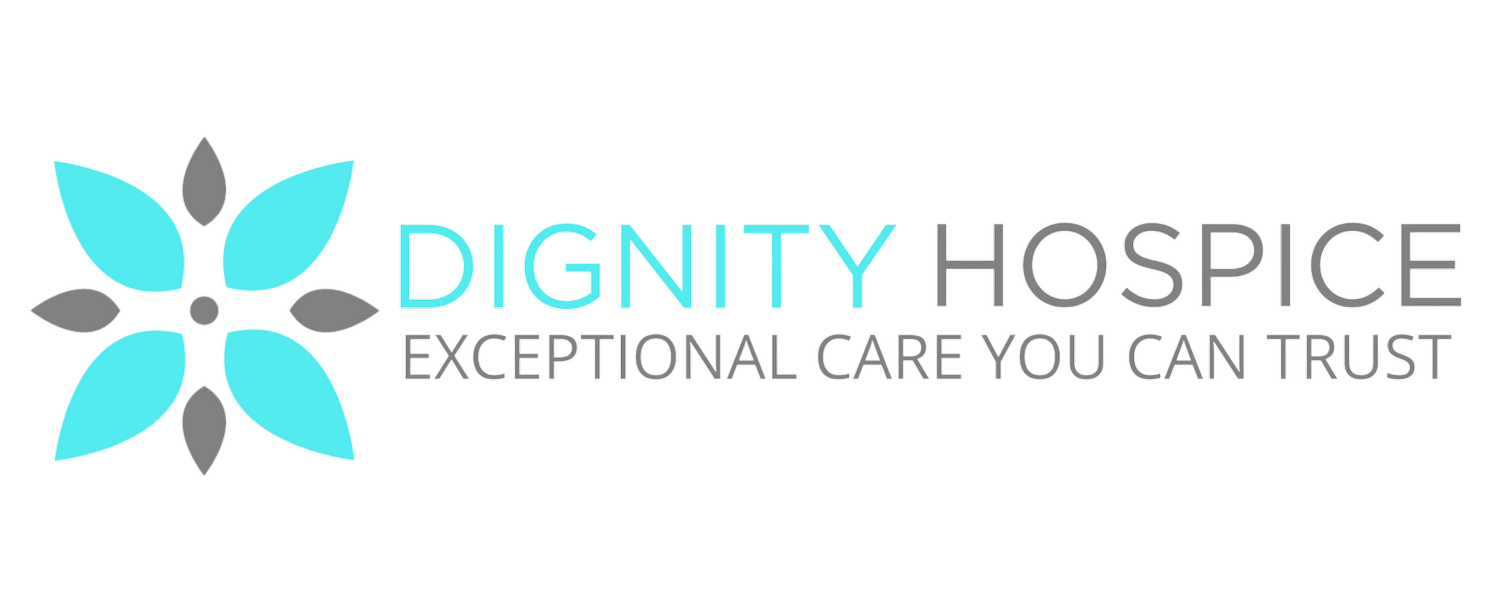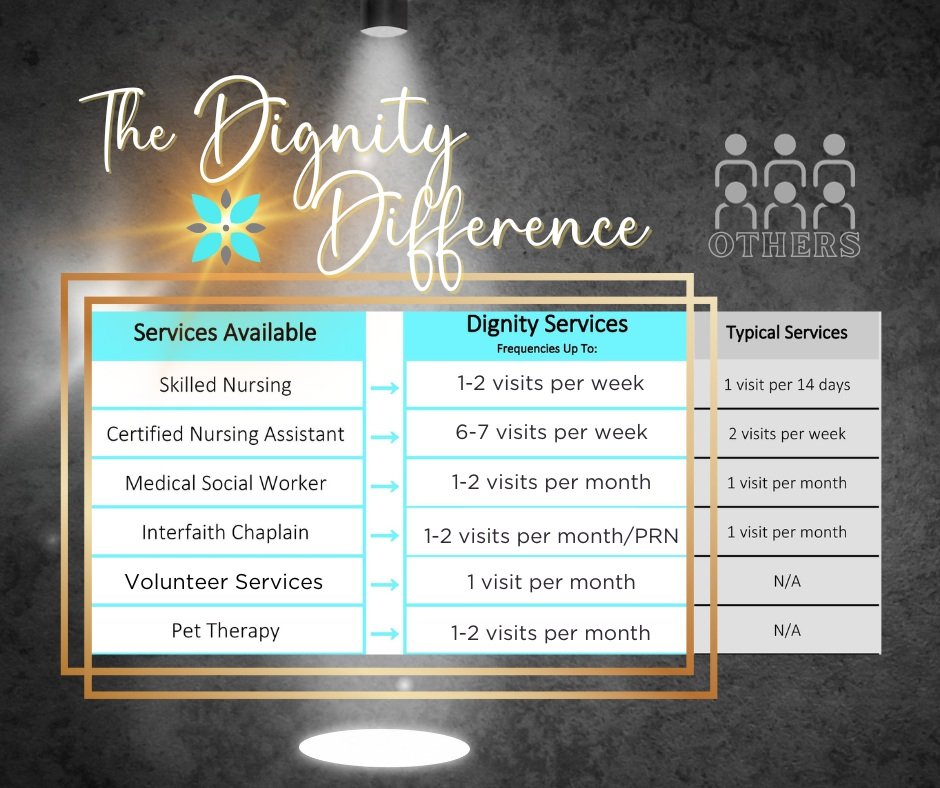
The Dignity Difference
Why should you choose Dignity Hospice?
At Dignity Hospice, we build a consistent care team for each patient as well as their family. This unique patient-centered approach has successfully resulted in a higher level of familiarity, care, and comfort for our patients, and it’s the reason why we are the preferred provider for so many families across Colorado.
We know you have many choices in hospice care, and it is important to know that hospice is not "one-size-fits-all". Many hospices offer different services, so it is key to know what options you have.
Patients and their responsible parties have the right to choose their own hospice provider,
regardless of 3rd party preference or primary care affiliations.
We feel that this tool helps compare 3 hospice organizations to allow you to easily find the differences so you can make the best choice for your loved one and your family needs.
Comparison Highlights
I’ve looked at the hospice comparison sheet, but why do those things matter?
Let’s take a look.
-
Being locally owned and operated means a hospice organization can offer more personalized, compassionate care without corporate hurdles. Additionally, local ownership fosters quicker decision-making and greater accountability, ensuring high-quality, responsive care for patients and families.
-
Choosing a hospice organization with stable ownership and the same name for five or more years offers several key advantages:
Experience and Stability: Long-standing organizations have proven stability and experience in providing hospice care, reflecting reliability and trustworthiness.
Reputation and Track Record: Established hospices have a reputation and track record that families can research and trust. Their history provides insight into the quality of care delivered over time.
Consistent Leadership: Consistent ownership often translates into consistent leadership and vision, ensuring that the values and standards of care remain steady.
Refined Processes: Over years of operation, established hospices have refined their care processes, policies, and protocols, leading to more efficient and effective service delivery.
Trained and Experienced Staff: Long-term operations allow for the retention and training of skilled and experienced staff, ensuring high-quality patient care and support.
Community Reputation: A long-standing hospice has likely built a strong reputation within the community and established relationships with local healthcare providers, enhancing coordination of care.
Avoiding Uncertain Outcomes: New hospices may carry uncertainties regarding their operational efficiency, quality of care, and financial stability compared to those with a proven history.
Quality Assurance: Established hospices often have more rigorous quality assurance measures and a history of compliance with regulatory standards, ensuring safer and more reliable care.
Patient and Family Testimonials: Families can benefit from the experiences and testimonials of previous patients and their families, offering peace of mind and confidence in their choice.
Accessibility of Resources: Long-standing hospices may have better access to resources, both internally and within the healthcare community, to provide comprehensive care.
Ultimately, choosing a hospice with a long history of stable ownership and operation ensures that families can rely on a tried and trusted organization to provide compassionate, high-quality end-of-life care.
-
Having 6-7 CNA visits a week provides consistent, comprehensive and individualized care, ensuring patient comfort and the ability to quickly address any issues that arise.
DID YOU KNOW: other hospice organizations typically only offer 2-3 CNA visits a week?
-
Hospice organizations that offer same-day evaluations and admissions provide a range of critical benefits for patients, families, and the broader healthcare system.
Here are some key advantages:Benefits for Patients
Rapid Symptom Management: Patients receive prompt care that can quickly address pain and other distressing symptoms, enhancing immediate comfort and quality of life.
Immediate Support: The timely presence of hospice professionals provides emotional and psychological support to patients right away, alleviating anxiety and fear.
Continuity of Care: Reduces the risk of unnecessary medical interventions and hospitalizations by ensuring seamless transition to hospice care, particularly for those in deteriorating health.
Benefits for Families
Reduced Stress: Families receive quick assurance that their loved one is under professional care, significantly reducing stress and emotional burden.
Timely Education and Guidance: Families can be immediately educated about hospice care and guided on how to manage their loved one’s needs, improving caregiving effectiveness.
Crisis Avoidance: Immediate evaluation and admission can prevent crises that might arise from unmanaged symptoms or lack of professional guidance.
Benefits for Healthcare Providers
Efficiency: Streamlines the patient care process, reducing prolonged hospital stays and emergency room visits, which in turn alleviates the burden on healthcare facilities.
Resource Allocation: Helps hospitals and other medical facilities manage their resources better by swiftly transitioning appropriate patients to hospice care.
Improved Outcomes: Facilitates better overall patient outcomes as care is provided in a timely manner suited to the patient’s needs.
Benefits for the Healthcare System
Cost-Effectiveness: By reducing the need for prolonged hospital stays and emergency interventions, same-day hospice admissions help reduce overall medical costs.
Optimized Care: Enhances the efficiency of the healthcare system, as patients are transitioned to the appropriate level of care without delay.
Pressure Relief: Alleviates pressure on emergency services and acute care providers, allowing them to focus on patients with different, often more immediate medical needs.
Providing same-day evaluations and admissions allows hospice organizations to offer critical, timely support, ensuring that patients and families receive the care and assurance they need without unnecessary delays.
-
Selecting a hospice organization that provides after-hours and weekend admissions offers significant benefits to both families and the community:
Benefits to Families
Immediate Access to Care: Families can gain immediate access to hospice services, regardless of the time or day, ensuring that urgent needs are promptly addressed.
Crisis Management: In emergencies or sudden health declines, after-hours admissions allow for quick intervention, which can provide comfort and stability for the patient and relieve family stress.
Flexibility: Families may have work or personal commitments that make it difficult to handle admissions during standard business hours. After-hours admissions offer greater flexibility.
Continuity of Care: Ensures that there is no gap in care, especially for patients transitioning from hospital to home hospice care outside regular hours.
Support During Critical Times: Weekends and evenings can be challenging periods for managing a patient’s symptoms without professional support. After-hours admissions mean that professional help is available when it’s most needed.
Benefits to the Community
Enhanced Accessibility: Provides the community with increased accessibility to vital hospice services, ensuring that support is available to everyone, regardless of timing.
Reduced Hospital Admissions: Patients can transition to hospice care more quickly, reducing unnecessary hospital admissions and strain on emergency services.
Community Trust: Offering around-the-clock admission services can enhance the community’s trust in the hospice, reinforcing its reputation as a responsive and caring institution.
Inclusive Care: Ensures that various community members, including those with non-traditional work hours or multiple responsibilities, can access care without delay.
Families and communities benefit significantly from the broader availability and immediate accessibility of hospice care, maximizing support, and ensuring compassionate care at any time.
-
Having after-hours hospice-trained RNs answering calls from families and communities in need offers several benefits compared to leaving a voicemail:
Immediate Support: Hospice-trained RNs can provide immediate assistance, addressing urgent needs or concerns without delay.
Expert Guidance: They offer professional advice, reducing anxiety for families and patients by providing knowledgeable and timely responses.
Crisis Management: They can handle medical emergencies or symptom management crises, ensuring necessary interventions are made quickly.
Emotional Support: Providing reassurance and emotional support during challenging times, they help alleviate stress for caregivers and families.
Continuity of Care: They ensure continuous care and communication, maintaining a seamless experience even during after-hours.
Timely Decision Making: Immediate access to trained professionals allows for quicker decision-making, which is crucial in hospice situations.
Reduction of Hospital Visits: Prompt management of symptoms can reduce unnecessary emergency room visits or hospital admissions.
Personalized Care: They can offer tailored advice based on the specific needs and medical history of the hospice patient.
Resource Allocation: RNs can efficiently guide the use of resources, ensuring that the right equipment, medications, and services are utilized promptly.
These benefits collectively enhance the quality of care, patient satisfaction, and overall hospice experience.
-
Choosing a hospice organization accredited by the Accreditation Commission for Health Care (ACHC) is crucial for families for several compelling reasons:
High Standards of Care: ACHC accreditation signifies that the hospice meets or exceeds rigorous standards for quality care set by an independent body. This ensures consistent, high-quality care for patients.
Compliance with Best Practices: ACHC-accredited hospices adhere to best practices and are regularly evaluated for compliance, providing reassurance that the organization maintains high operational and clinical standards.
Patient Safety: The accreditation focuses on patient safety, ensuring that the hospice follows strict protocols to prevent errors and safeguard the health and well-being of patients.
Experienced Staff: Accreditation often requires that staff are well-trained and certified, ensuring that patients receive care from qualified and competent professionals.
Continuous Improvement: ACHC-accredited hospices are committed to continuous improvement and undergo regular reviews and updates to their practices, keeping them aligned with the latest in hospice care innovations and standards.
Legal and Ethical Compliance: ACHC requires accredited organizations to comply with all relevant laws and regulations, ensuring ethical and legal standards are upheld.
Reputation and Trust: Accreditation by an esteemed body like ACHC enhances the hospice's reputation for reliability and trustworthiness, giving families confidence in their choice.
Comprehensive Care: ACHC standards cover all aspects of hospice care, ensuring that patients receive comprehensive and holistic care tailored to their needs.
Accountability: Accredited hospices are held accountable for their practices and must address any deficiencies swiftly, ensuring consistent quality.
Family Support: Accredited hospices often provide enhanced support services for families, including emotional, psychological, and practical assistance, ensuring a more holistic approach to care.
Resource Access: ACHC-accredited hospices often have better access to resources, collaborations, and networks, which can enhance the overall care provided.
Peace of Mind: Knowing that a hospice is ACHC accredited can bring peace of mind to families, who can trust that their loved one is in an environment that prioritizes safety, quality, and compassionate care.
Ultimately, ACHC accreditation serves as a hallmark of excellence, ensuring that the hospice organization provides the highest standards of care and support to patients and their families during an incredibly vulnerable time.


